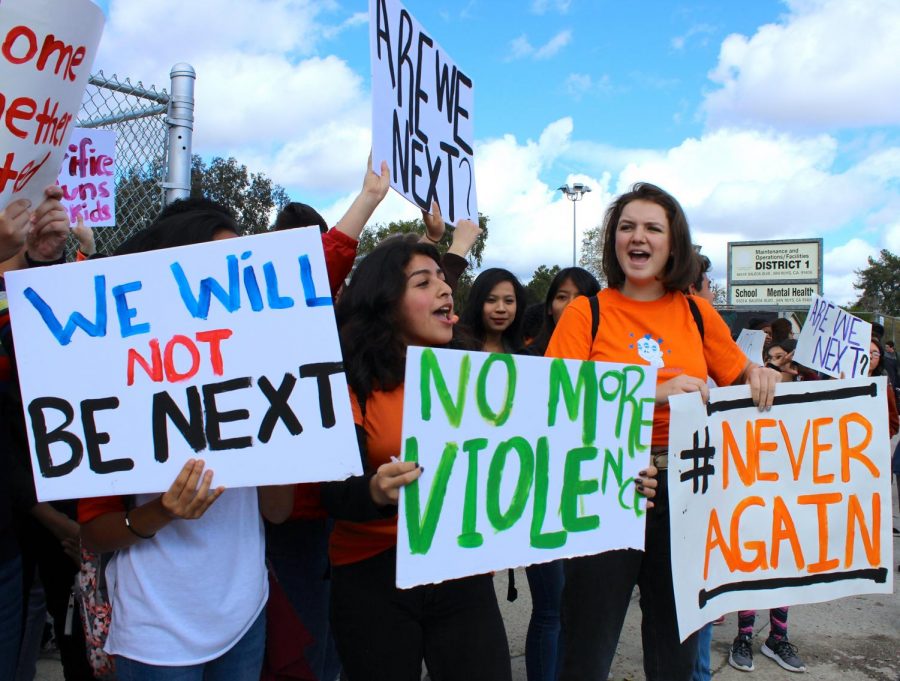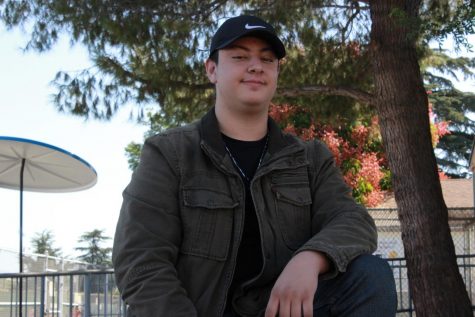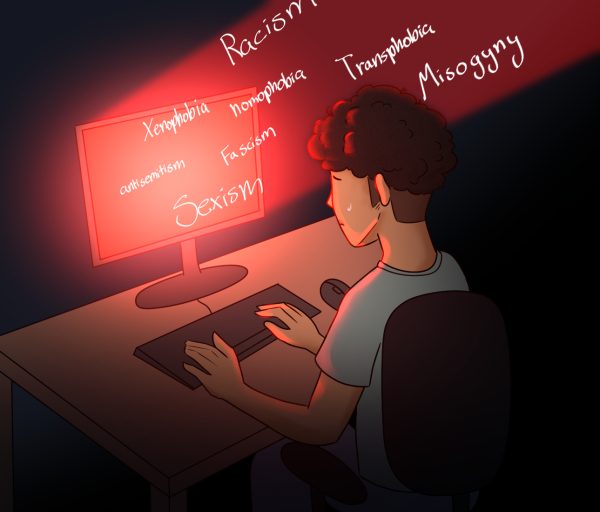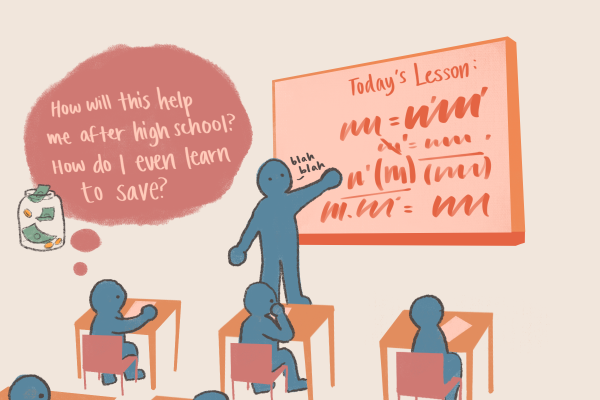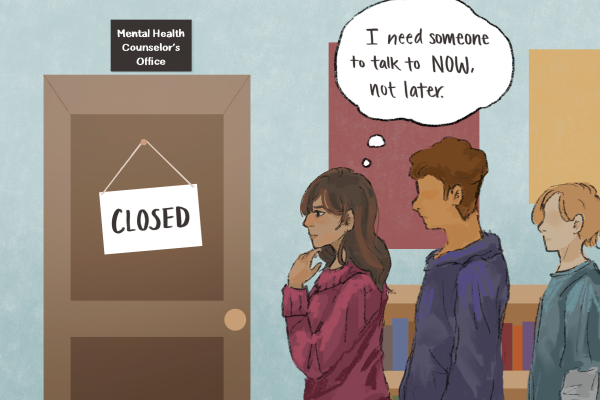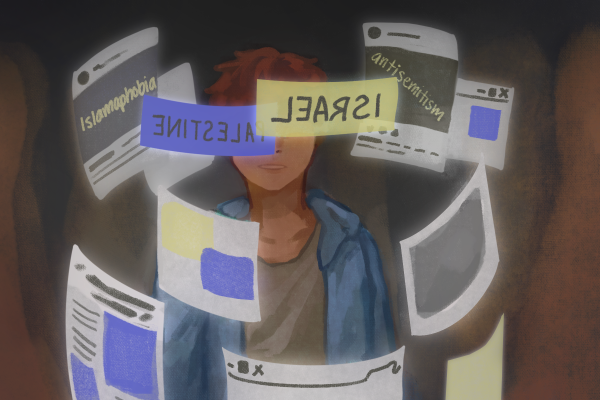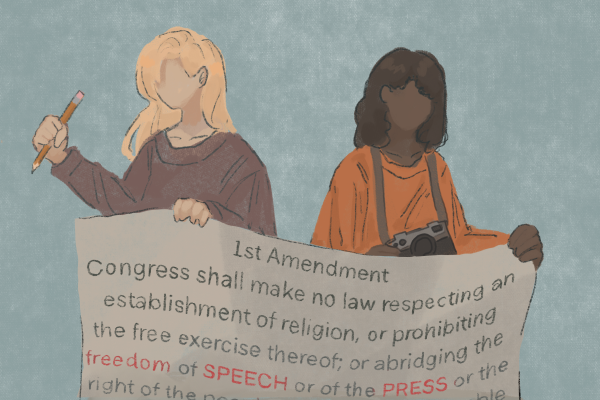Gun violence still strong issue for youth
Daniel Pearl Magnet High School students hold and chant their posters during the #Enough Walkout on March 14.
February 14, 2020
Valentine’s Day marks the two-year anniversary of the Marjory Stoneman Douglas High School (MSDHS) shooting in Parkland, Florida, where a gunman killed 17 students on campus and injured 17 others. The tragedy sparked a national outcry surrounding the increasing number of school shootings and gun violence. Students from MSDHS shortly assembled the political action committee Never Again MSD to advocate for gun control and on March 24, 2018, led an estimated 1.2 million students around the country in March For Our Lives, a walkout to protest the lack of regulation around firearms.
Since March for Our Lives, no substantial legislation has been passed in Congress or Senate to actually combat it, despite the fact that gun violence has consistently remained in the media. According to Gun Violence Archive, a nonprofit research group that catalogs gun violence in the United States, 14,789 people were killed by guns in 2018 and 15,208 people were killed by guns in 2019.
Most recently, the Background Check Expansion Act, a bill that would’ve enforced universal background checks for all gun owners, was blocked in Senate on Nov. 14, the same day a student at Saugus High School in Santa Clarita, California, opened fire on campus, killing two students.
“If this so-called common-sense bipartisan legislation was indeed crafted with strong bipartisan input, it shouldn’t have any problems advancing by regular order,” senator Cindy Hyde – Smith (R-MS), the senator who blocked the motion, said on the Congress floor on Nov. 14. “Many questions about this legislation need to be answered before it’s forced upon law-abiding gun owners.”
Gun control has also been in the news because of the ongoing Democratic presidential debates. Candidates have proposed a varying spectrum of policy on gun control but two policies which all candidates favor are universal background checks and a ban on all assault weapons, which are guns with detachable parts and multiple accessories.
“I do not think it is unreasonable to say that you should be able to go to the store without the fear of being gunned down,” Democratic candidate Bernie Sanders said in a New York Times interview on Jan.13. “We can and we will end the epidemic of gun violence in this country.”
The threat of gun violence cannot continue to concern us the way it is right now. It is heavily discussed every time a mass shooting breaks out and slowly dies back down until the next one occurs. So long as guns are protected and sloppily unchecked the way they are, there will always be a next one and another list of names to mourn.
The biggest reason there is nothing changing the federal laws surrounding guns is that both democratic and republican politicians accept donations from the National Rifle Association (NRA), a gun rights advocacy group, with 2018’s election cycle alone totaling $880,521 across the House and Senate. Money taken from the NRA makes politicians dependent on the organization and allows it to lobby politicians to loosen restrictions on guns and block any legislation to counter gun violence.
Gun violence cannot be properly dealt with without also talking about law enforcement’s contribution to it. According to a 2014 study conducted by the Economist, police in America kill more people daily than countries like Japan, Britain and Germany kill in one year, with Japan and Britain killing no people, Germany killing eight and America killing 458 per 100,000 people. This is contradictory and unacceptable from a country who boasts of its forwardness and superiority to other countries.
Mapping Police Violence, a crowdsourced database that tracks police killings, reported that in 2018, police officers killed 1,164 civilians, with little to no repercussions; no police officer lost their jobs for killing unarmed civilians or “accidental” shootings.
The authority that police have is both due to and upheld by this lack of accountability, and that’s another factor that can be attributed to no federal law calling for background checks; it would cause many unqualified officers to lose their jobs, and rightfully so.
We do not need assault weapons and neither do our police departments. Assault weapons are most commonly used in the United States Army and to have such destructive devices so easily distributed to the public is a hazard to the safety of the people living in proximity to them.
Granting police access to assault weapons further militarizes law enforcement and makes it easier for police to abuse their power and brutally govern over American civilians. These weapons are an accessory to authoritarian law enforcement, not a necessity.
It is tiring to talk of the increasing rates at which gun violence takes lives and have to offer people as proof of necessary and immediate change. Gun violence is not an issue that can be ignored and neglected the way it so blatantly is. We need our representatives to create and push laws that protect us, not laws fueled by greed that protect gun manufacturers.


